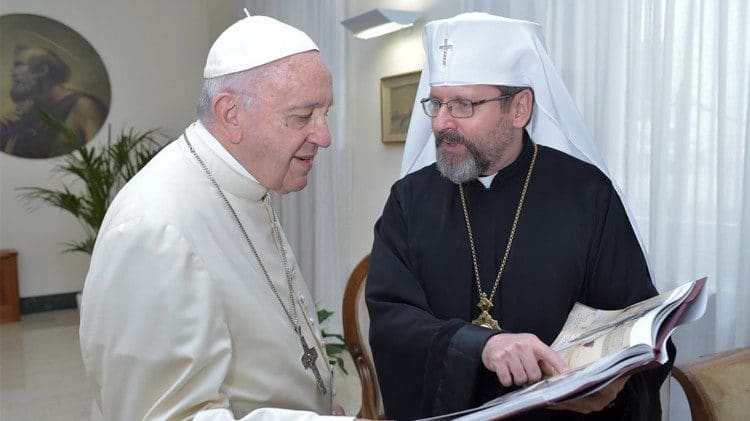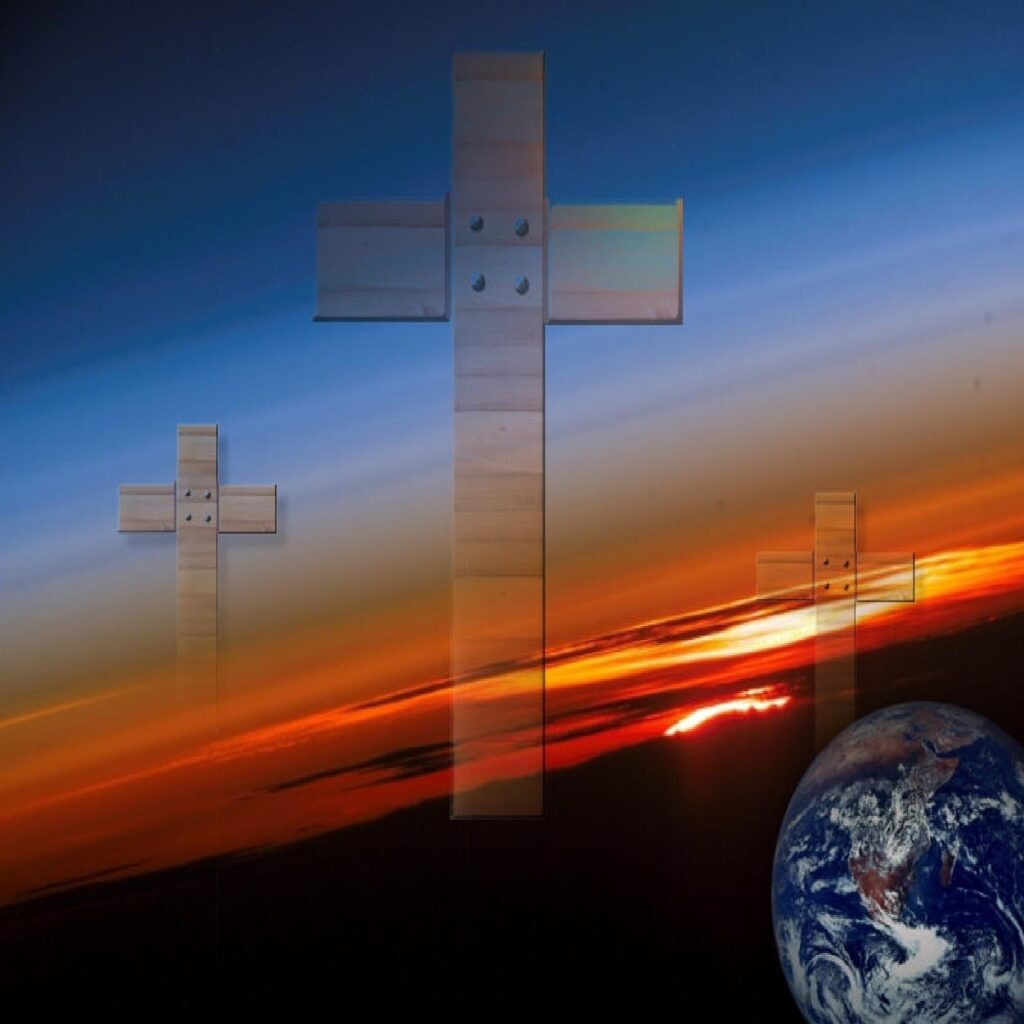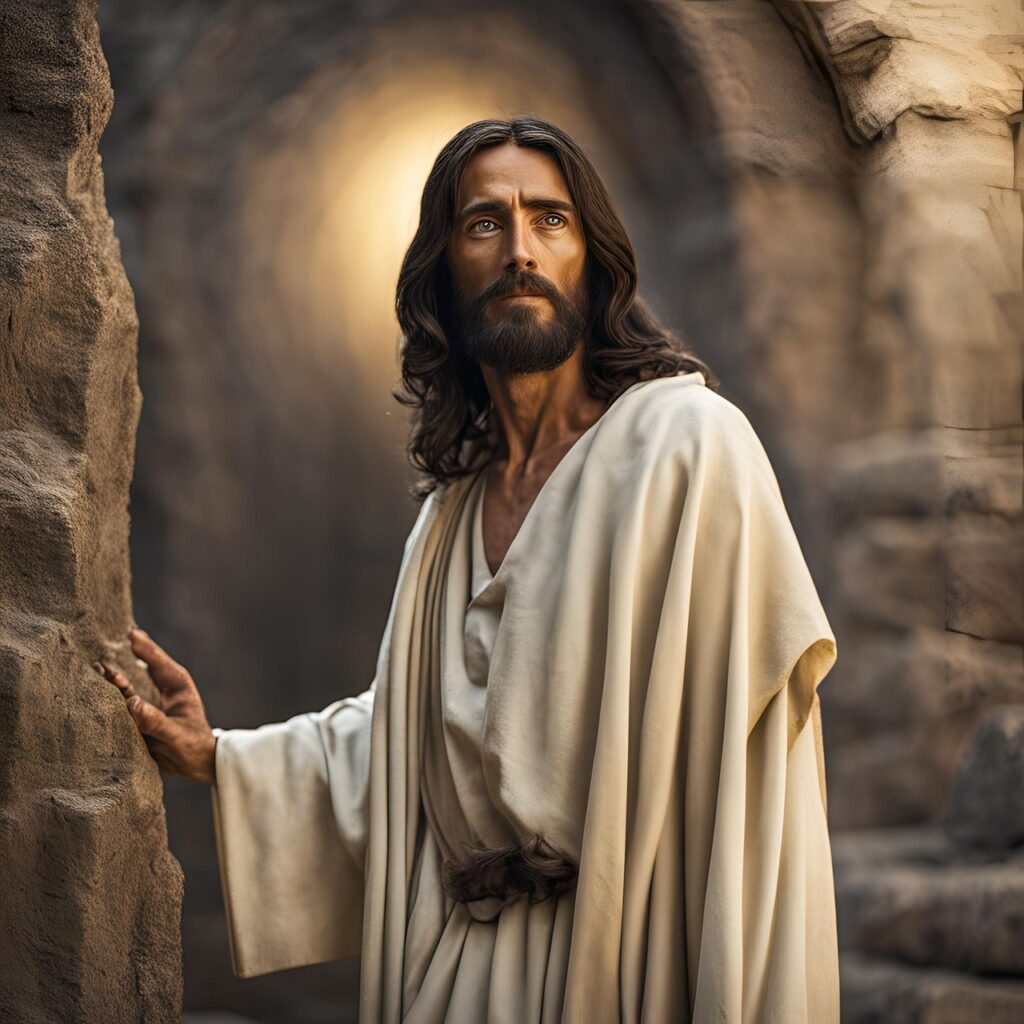Twenty Years of War in Ukraine, Mobilization of the Church
Archbishop Shevchuk Meets with Journalists: ‘The Actions Decided by the Synod. We Are at the Center of a Confrontation Between Russia and the West’

Twenty Years of War in Ukraine have required the mobilization of the Church.
“Fear is growing, every day we receive news that says we are surrounded by the Russian Army. Yesterday the Minister of Defense said that there are 150,000 Russian soldiers around Ukraine and the Black Sea. At this moment of tension, it’s very helpful to be with friends, it demonstrates solidarity, that we aren’t forgotten, while the Ukrainian society wonders what it can do to halt the violence and to avoid war. And what we can do as Christians to help human lives, to contribute to peace,” exhorted His Beatitude Sviatoslav Shevchuk, Major Archbishop of the Ukrainian Greek-Catholic Church, during his online meeting with journalists, organized by the Iscom Association. The Prelate also heads the Arch-Patriarchate of Kyiv, headquarters, in fact, of the Major Archbishop, and the presidency of the Synod of the Ukrainian Greek-Catholic Church.
Under Attack for the Past Eight Years
Archbishop Shevchuk recalled how “for eight years Ukraine has been living under Russia’s military attack.” The Army first annexed Crimea, then entered Donbass, an “important industrial region of Eastern Ukraine. We lost close to 14% of our territory and 25% of its industrial potential: carbon and metal mines, the chemical industry.” A tragedy that has caused thousands of deaths. “The official numbers are that 14,000 people were killed, the reality it’s always double, perhaps triple. We have two million internally displaced people, although we were able to address this humanitarian crisis.”
A Different Conflict
However, the situation is different now. According to authoritative political scientists and diplomats, “the escalation is different from what it was eight years ago. It’s no longer a bilateral conflict. In fact, before Russia always denied it was part of the conflict, saying it was a civil war. But Russian arms are found everywhere. Ukraine, Western powers, and Russia took part in the Minsk Agreements, which spoke in the name of separatist groups. Now we are before a confrontation between Russia and the West. Ukraine is even absent from political meetings. In Russia’s ultimatum there was no mention of Ukraine, but of the methods of relations with NATO or with the United States.”
The result is that Ukraine “is in the middle of two blocs, which are confronting one another, and we don’t know what will happen. It is at the geographic, historical, economic, and social epicenter of this confrontation. We are under imminent and grave danger. It’s a very fragile situation and everyone knows that it can get worse at any moment.
Not Only a Military Confrontation
Archbishop Shevchuk then stressed that “it’s about a hybrid war, made up at least of four ways of confrontation. Now the concentration “is on the military, which grows ever more worrisome.” The second way is disinformation. It’s a “propaganda war, which in Ukraine is one of the heavier weapons. Russians, Americans, Germans are writing on the Internet and the people are afraid. Recently the order of evacuation of the Embassies of the USA, Canada, and Great Britain had the effect of a bomb.”
A Political War
Then there is the political war. “What would be the purpose of a Russian invasion?” asked the Archbishop. To dominate with tanks as in Prague or in Hungary? Perhaps not, Ukraine is too big. To dominate it with arms would take one million soldiers. So, what is the military purpose? It seems to be that of changing the government to install a regime loyal to Russia and to proceed to the reintegration of the former Soviet Union. The States of the former USSR are regarded as vital areas of geopolitical interest of the Russian Federation; hence, they are interested in installing a favorable regime including by force. For us, it would mean losing our sovereignty, independence, and freedom. For the Churches, it would mean a return to the catacombs, to lose religious liberty: we remember well the time of the USSR.”
An Economic War
Finally, an economic war. “All are discussing the fate of Russia’s Nord Stream and gas pipelines. The West is feeling the effects of the increase in the price of gas. On our side, it’s a social drama. Small and medium-sized businesses are closing that use gas for production. The economic pressure is felt at all levels and causes the impoverishment of the people. According to a survey held yesterday, the number of people has trebled who are unable to pay their rent. Last year we launched, as Church, the program to feed the hungry. This year it’s to warm those that are cold. Many don’t have the means to heat their homes. The psychological pressure is such that it makes people withdraw money from the banks because the banking system could collapse. In some regions, the people are stocking up on food. Many are preparing so-called emergency bags. Bomb shelters have reappeared in Kiev.”
The Role of the Church
It’s a complex and complicated picture: what can the Church do in these conditions? “This question was at the center of last week’s discussion of the Synod of Bishops. Obviously, we must do everything possible to prevent the worsening of the situation, the military solution of escalation, but we must prepare ourselves not to be the prey of being without. What answer should be given? The military thinks of arms, the politician of mechanisms of the State so it can govern, the diplomats work intensely to create support for Ukraine. Kiev has become the most famous capital of the world for diplomatic visitors. . . But what must we do? We have agreed on four points of the Church,” said Archbishop Shevchuk.
Prayer for Peace
The first answer is prayer for peace. “Every day at 8:00 pm (7:00 pm in Rome) we pray the Rosary and thousands of people gather to watch it on TV. I also ask you to pray at 7:00 pm at least one Our Father, as the Pope invited us to do, in his appeal for peace on January 26. For us, it was a very intense spiritual moment at the universal level. Not only did it make us feel the Lord present with us but it has formed minds and hearts. It was very comforting to know that Catholics in Russia were praying with us. Monsignor Pezzi, Metropolitan of Moscow, led the prayer. The Apostolic Nuncio did the same in Minsk. It’s a great strength, a fully Christian response.”
The initiative started eight years ago, “but was relaunched in the Synod’s appeal last November and it is accompanied by fasting. Every Eparchy has a day of fasting. The day before yesterday 36,000 people prayed through YouTube. Many also were the private initiatives.”
Solidarity
The second is solidarity with those suffering most. “From the spiritual and psychological point of view, for people who feel they must do something, we are organizing ways of humanitarian service. With the experience of the occupation of Crimea and Donbass, Caritas has developed very effective mechanisms.”
Preachers of Hope
The third point singled out is to infuse hope. “We must be preachers of hope when the media transmit a paralyzing fear. The Church preaches hope, the Lord is with us, He saves us not from problems but in the middle of troubles. The proclamation of the Gospel opens horizons not to destroy but to build relations between men, to help those in need, to build a positive vision of the future.”
Social Consolidation
Finally, the consolidation of the society. “Joined to our proactive action are non-Catholics and non-believers who want to do something for the common good. This consolidation is very much felt. On the basis of a sociological survey, the Ukrainians stated their trust in three entities: the army, volunteers, and the Churches. 63% acknowledge a moral authority not so much to a Confession but they have in mind the Pan-Ukrainian Council of Churches. 70% of Ukrainians are believers. They have great trust, sometimes I say too much . . . it’s a huge responsibility but it’s an example that is followed.”
The Pope’s Closeness
The Archbishop stressed that the Pope “follows the situation up close; he has prayed several times for peace in Ukraine. I’m thinking of his Christmas Urbi et Orbi address and the appeal for a World Day of Prayer was very appreciated. He is very worried. The Vatican is making every possible effort at the diplomatic level.”
But could it do more? Is there the fear of irritating Moscow knowing the Pope’s relations with the Russian Orthodox Church? “To hear words of condemnation of an unjust aggressor would please us Ukrainians but if the Holy See would pronounce them through every possible mediation. The style of Vatican diplomacy is always to be above the conflict, to have the freedom to mediate and to reconcile the opposite parties. But the Holy See has helped us a lot to release hostages, to protect Catholics in the occupied zone of Crimea; it has done so much for us, even without making big statements of condemnation.”
Relations Between the Churches
Responding to a question of Exaudi on the weight that relations between the Churches have in the escalation of tensions, Archbishop Shevchuk explained that “the people expect from leaders of the Churches that they collaborate for peace and they judge negatively any sort of confrontation between the hierarchies. There is always the temptation to instrumentalize religion for political purposes.
I mention a recent example. We followed with great attention the meeting of the UN Security Council and we learned with displeasure of the intervention of the representative of the Russian Federation who mentioned as a positive motive for the invasion of Ukraine the conflict between the Orthodox Churches. This caused anger among the Ukrainian Orthodox. There is no religious war between the Orthodox; they do all they can to ensure religious peace as an important element for national security. Everyone understands it. It emerges also in the survey I mentioned. I think that, if we all listened to the voice of the people, we would go on the right way.”
In regard to the possible entrance of Ukraine into NATO, the Archbishop reminded us that it’s not about his personal opinion. “In the Ukrainian Constitution, there is the plan to be part of the European Land of NATO. It doesn’t depend on me. The more the Russian menace grows, the more Ukraine seeks allies. Before the aggression, the majority did not see the entrance into NATO as a solution. This sentiment grew after the invasion.”
A Trip of the Pope?
Finally, on the possibility of a trip of the Pontiff, Archbishop Shevchuk said that “Pope Francis is considered the greatest moral authority in the world, not only of Catholics. And the people think if he came to Ukraine the war would end. Therefore, we hope he will visit.”
Translation by Virginia M. Forrester
Related

Reflection by Bishop Enrique Díaz: The Lord’s mercy is eternal. Alleluia
Enrique Díaz
27 April, 2025
5 min

After Eight Days Jesus Arrived: Commentary by Fr. Jorge Miró
Jorge Miró
26 April, 2025
3 min

The Perspectivas del Trabajo Foundation is founded with the aim of promoting virtues for professional development
Exaudi Staff
25 April, 2025
2 min

Reflection by Bishop Enrique Díaz: Alleluia, alleluia
Enrique Díaz
20 April, 2025
5 min
 (EN)
(EN)
 (ES)
(ES)
 (IT)
(IT)

